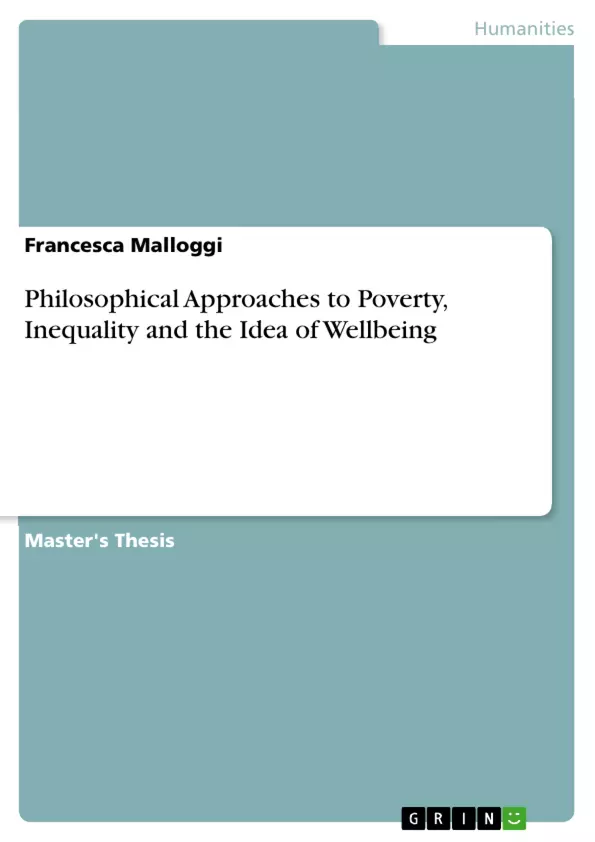There are many definitions of poverty in a legal and philosophical sense, coming from many different institutions such as the UN, EU, individual countries and from many different philosophers. In the following work, I will suggest that we should analyze poverty and broaden the meaning together with the way of
measuring it, especially adopting Amartya Sen's approach. For the moment, when discussing poverty, I will refer to the de nition given by A Dictionary of Sociology (2009), in which “poverty is a state in which resources, usually material but sometimes cultural, are lacking” (Scott and Marshall, 2009).
I aim at suggesting that my analysis of relative poverty shall be taken into account not only for social and
economic policies but also when dealing with issues about absolute poverty because the quality of people's life has to be determined with broader terms when speaking about developed countries; indeed, as I will show in the course of the thesis, because having a full-time job can still be related to a deprived situation for the human being, and even though the deprivation of the persons can be more or less severe regarding relative and absolute poverty, the level of suffering of the human being is still very high and therefore it requires attention and more sensitivity.Poverty and inequality are deeply interconnected and they can be broadly defined as the functioning and the outcome of the same system: the economic system based on capitalism. Poverty is functional for the capitalist system because it serves as “lubricants, greasing the joints of an otherwise creaky social system” (Wachtel, 1972; pg. 17).
Poverty plays a functional part within this system as it is about the increased value of the real income of people that fall shortly above the line of the non-poor, and it works as an illusion of a given state of affairs. Also, the level of poverty allows the non-poor to buy commodities at lower prices and from this point of view, we are all served by the existence of poverty.
Moreover, the second function regards the general conditions created by poverty because it ensures that the “dirty work” (Wachtel, 1972) will be done, such as dangerous, precarious, underpaid and undigni ed jobs. Poverty allows for the formation of a labor force, people who need to work whatever the physical and metaphorical costs are.
Inhaltsverzeichnis (Table of Contents)
- Introduction
- Chapter One. Ideas of Justice in a Liberal Framework.
- 1.1 Explaining Rawls.
- 1.2 Sen's Criticism of Rawls
- 1.3 Sen's Critique toward Ideal Theory.
- Chapter Two. Measuring Poverty, Inequality and Wellbeing in a Liberal Framework.
- 2.1 Principles of Justice; First Principle.
- 2.3 The Difference Principle.
- 2.2 Principles of Justice; Problems arising from the Second Principle about Inequality and Poverty.
- 2.4 The Primary Good Index and The Capability Approach.
- 2.5 Valuing freedom.
- 2.6 Evaluating Poverty and Well-Being in the Capitalist Economic System.
- Chapter Three. Capitalism, Freedom, and Democracy.
- 3.1 Sen and Rawls on Capitalism.
- 3.2 Final Thoughts on Capitalism.
- 3.3 Final Remarks on Sen's and Rawls' approaches in relation to Capitalism.
Zielsetzung und Themenschwerpunkte (Objectives and Key Themes)
This work aims to explore the philosophical and economic dimensions of poverty and inequality within a capitalist system. It analyzes the contributions of John Rawls and Amartya Sen, two influential figures in political philosophy, in order to identify the most effective approach to addressing these complex societal issues.
- The philosophical foundations of justice in a liberal framework, particularly examining the works of John Rawls and Amartya Sen.
- The measurement of poverty, inequality, and well-being, focusing on the strengths and limitations of various approaches, including Rawls' theory of justice as fairness and Sen's capability approach.
- The role of capitalism in creating and perpetuating poverty and inequality, analyzing the arguments of Sen and Rawls regarding the compatibility of capitalism with principles of justice.
- The relationship between poverty, inequality, and democratic values, considering the potential threats to political and social stability posed by high levels of economic disparity.
- The need for a comprehensive understanding of poverty that extends beyond material resources and encompasses human capabilities, well-being, and societal conditions.
Zusammenfassung der Kapitel (Chapter Summaries)
Chapter One delves into the philosophical underpinnings of justice within a liberal framework, examining the critiques of Rawls' theory of justice as fairness put forth by Amartya Sen. The chapter highlights key disagreements concerning the concept of an original position, individual rationality, and the limitations of ideal theory in addressing practical concerns.
Chapter Two explores the complexities of measuring poverty, inequality, and well-being within a liberal framework. It critically analyzes Rawls' principles of justice, particularly the Difference Principle, and identifies potential shortcomings in its application. The chapter then introduces Sen's capability approach and its implications for understanding and evaluating human well-being.
Schlüsselwörter (Keywords)
The primary focus of this work lies within the realm of philosophical and economic analysis of poverty, inequality, and well-being, particularly as they relate to the capitalist system. Key terms and concepts include justice as fairness, capability approach, primary goods, income inequality, social contract theory, liberal framework, and democratic values. The contributions of John Rawls and Amartya Sen serve as the foundation for understanding and challenging existing theoretical frameworks.
- Quote paper
- Francesca Malloggi (Author), 2017, Philosophical Approaches to Poverty, Inequality and the Idea of Wellbeing, Munich, GRIN Verlag, https://www.grin.com/document/381368



